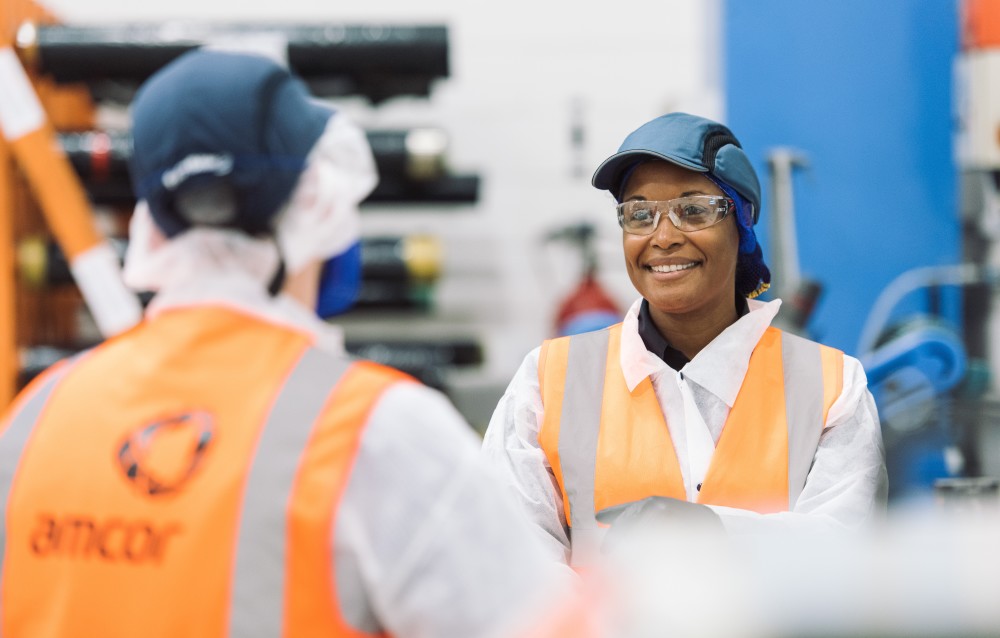EHS leading the way through, and beyond, the global pandemic
Safety
July 6, 2022Reading time: 3 minutes
Over the past two years, the COVID-19 pandemic has dramatically altered our day-to-day lives. As we learn to navigate this new environment, it’s important that we reflect on the impact it has had on our workplace from an environment, health and safety (EHS) perspective, and look forward to a future of continued progress.
Over the past two years, the COVID-19 pandemic has dramatically altered our day-to-day lives. As we learn to navigate this new environment, it’s important that we reflect on the impact it has had on our workplace from an environment, health and safety (EHS) perspective, and look forward to a future of continued progress.

The great pivot
Considered as essential service, Amcor’s manufacturing employees worked on-site through the pandemic, with rigorous health and safety protocols in place to keep the people who produce our packaging safe and healthy. At the same time, lockdowns around the world prohibited customer-facing employees from performing those responsibilities, putting an end to visits at Amcor’s production, research and development facilities in many countries. Upon recognizing this shift, an opportunity arose to reimagine customer-facing employees’ working day in a way that would assure the health and safety of our fellow colleagues every day amid a global pandemic.
Across Amcor’s global manufacturing network, sharing of industry best practices and upskilling to establish and maintain six protocols at all locations for a prolonged time is essential. Those protocols included — but were not limited to — pre-entry temperature screenings, social distancing, mask wearing, and so on. Reinforcement of these basic protocols every day helped keep our people healthy, our plants running and our reputation intact.
As we emerge from the global pandemic at the present time, Amcor has seen strong results in our focus areas, with a 29% reduction in serious injury or fatality (SIF) incidents and a 22% reduction in hand injuries. Our collective focus on safety, more specifically SIF and hand exposures, has contributed to this decline. It is important to remember that these are not just numbers — workplace injuries often have a devastating impact on the lives of colleagues and their families, as well as unnecessary costs.
Physical safety and emotional wellbeing
Through the pandemic, government-imposed health measures on employers around the world meant employers would take on a more substantial role in managing employee health issues in the workplace, in addition to the traditional role of industrial safety and compliance. For employees who found themselves working from home for long periods of time, our EHS teams proactively reached out to raise awareness of mental health risks posed by changes in routine, environment and social interaction. The effort also offered support for employees experiencing emotional health issues as they remained working on-site at an unprecedented and uncertain time. These types of efforts are sometimes addressed as part of an organization’s health benefits or employee assistance program (EAP).
Attracting talent through safety
Leading EHS performance is a business imperative from an operational standpoint, as well as a competitive advantage. In the context of tight labor markets and "the great resignation" following the pandemic, having a reputation for maintaining a safe and secure environment helps businesses attract and retain talent. Younger generations, in particular, desire to work for companies that have holistic programs encompassing health, safety, social connection and one’s own well-being. According to a recent Gallup poll, 61% of today’s workforce rank well-being and work-life balance as very important, up from 53% from 2015. At Amcor, we realize that adherence to our contemporary EHS policies and practices are foundational to the well-being of our workforce, and also for attracting top professionals to our workforce, including EHS. This all fuels the processes that drive safety, compliance and results.
Building upon a powerful EHS culture
Amcor has always held safety as a core value, which remains unwavering even when priorities may shift. Recently, this company value has taken on additional importance, as the global pandemic began accelerating what had already been in motion — shaping a company culture that embraces desirable health and safety beliefs, executes tangible best practices and reinforces them daily as the way we work.
Amcor is currently rounding out its EHS framework with clear, best-in-class EHS standards, programs and training. Most of these basics exist today, but are being bundled in an easily accessible form. The EHS framework includes everything needed to develop and execute a contemporary EHS management system, including new training modules, risk-assessment tools, guidance on recordkeeping and reporting laws, our internal self-assessment and audit programs, and much more. The intent of aligning on an EHS framework is that it will enhance our collective awareness of risks and how to mitigate them with confidence.
Continuing our success
Amcor takes its role as the global leader in responsible packaging seriously. For many years now, we have put special emphasis on safety and generated strong results. Our capability to manage the “condition” of safety every day across Amcor helps our people work safely, and without unnecessary injury. At Amcor, we realize we must continue to demonstrate care for our people every day, as we do our own biological family. “Management commitment” and “employee engagement” are two vital components to our effort to evolve safety culture to next level. The more we collectively demonstrate progress in these two areas, the safer Amcor and our employees will be.
Success is evident when, over time, a continued effort exists from top-down to reinforce the beliefs and behaviors we desire every day. This normalizes the concept of proactive safety and instils a desire to behave in those ways. Management simply expects and reinforces these behaviors without exception. This is the organizational accountability needed to achieve incremental, sustainable results.
Finally, a big thanks to all of my Amcor colleagues for your work and continued commitment to Amcor health and safety.
